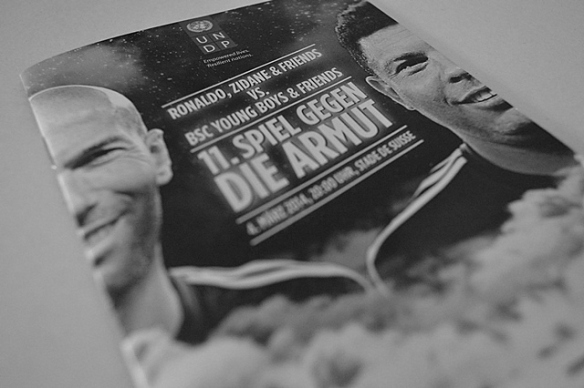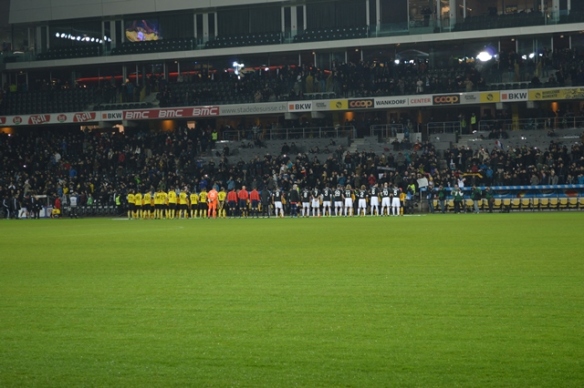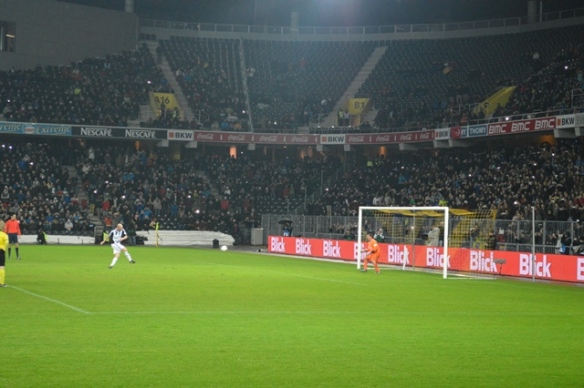I was totally impressed by the Match Against Poverty in Bern on Tuesday, 4 March. Not just that the match was great, full of goals and actions (it was 8:6 for Zidane&Ronaldo and friends in the end), it was also played with the purpose of helping the Philippines. In this blog you can find some of my thoughts and impressions about the game that were originally published here, but soon I will write a more detailed report about the whole trip to Switzerland and some (sports) international organisations.
Football is a great source of entertainment. But are entertainment and serious issues mutually exclusive? Tuesday’s Match Against Poverty in Bern, organised on an annual level by the United Nations Development Programme (UNDP), certainly proves the contrary – football can be used for noble purposes, too.
Stade de Suisse, the second biggest stadium in Switzerland and the home ground of BSC Young Boys, was filled with football enthusiasts. We were all waiting for the 11th Match Against Poverty to begin.The Match Against Poverty has been held annually since 2003 at the initiative of the UNDP Goodwill Ambassadors Zinédine Zidane and Luís Nazario de Lima, more known as Ronaldo, with the aim to raise awareness about the Millennium Development Goals (MDGs) and mobilise people to contribute to poverty alleviation. The objective of the match in general is to raise funds to support specific development projects selected by the UNDP. Two thirds of the match proceeds will be used to bolster recovery efforts in the Philippines, where more than 5,000 people lost their lives to Typhoon Haiyan, with almost 1 million people displaced and an estimated further 11.8 million affected. BSC Young Boys will donate the remaining third of the profits to the club’s partner charity, the Laureus Foundation Switzerland, which provides financial and practical support to sports-related projects at the national level.
Ronaldo and Zidane had mobilised a team of internationally renowned football players, some of the biggest names in football, to play against the professional club from Bern, BSC Young Boys, consisting of current and former club’s players. The list of footballers who joined Ronaldo and Zidane includes: Ronald de Boer (Netherlands), Steve McManaman and Jamie Carragher (England), Robert Pires, Christian Karembeu, Youri Djorkaeff and Patrick Vieira (France), Davor Šuker (Croatia), Gaizka Mendieta, Fernando Hierro and Michel Salgado (Spain), Paulo Ferreira, Fernando Couto, Nuno Gomez, Luis Figo and Paulo Sousa (Portugal), Marta and Giovane Elber (Brasil), Pavel Nedvěd (Czech Republic), Carlo Cudicini, Paolo Maldini, Gianluca Zambrotta, Gennaro Gattuso, Christian Vieri and Fabio Cannavaro (Italy), Hakan Sukur (Turkey) Hidetoshi Nakata (Japan), Antonios Nikopolidis (Greece), Santiago Solari (Argentina) and Freddie Ljungberg (Sweden). The referee of the match was one of the best refereesno other than the legend of in modern football, Pierluigi Collina.
It was impressive to see the crowd’s excitement when the footballers started to warm up. I tend not to be a drama queen, but I must admit that when the football legends came on the pitch, I held my breath for a while. After all, Ronaldo, Zidane, Makéléle, Figo, Vieri and all the others were the ones who introduced the world of football to me when I was a little girl. I still remember how we were fighting with my friends over “who will be Zidane” and “who will be Figo” when playing football. Not to mention all the fuss with exchanging album stickers during the FIFA World Cups and EUROs and how hard it was to get some of the players mentioned above. It was our childhood dream to see these football players play live. They were our big role models.
An athlete as a role model is a contested term. While the argument in favour is centred around the concepts such as hard work, success, fair-play, persistence, performance, dedication and determination, some critics say that professional athletes are just over-paid dolls in the system of capitalist sports industry which exploits the popular appeal of sport. No matter which side one is leaning to, the fact remains that many people, especially children, look up to famous and successful athletes. It is therefore important that the athletes remain self-aware about their position not just in a specific sport, but in the society as a whole. The true role models, in my opinion, are the ones who acknowledge their popularity and power and utilise them for the good – not just on the pitch. That’s where charity comes in. Apart from their success, a big number of celebrities are known for their humanitarian projects. One might of course criticise such celebrity humanitarianism as self-promotion, marketing and attention seeking. But regardless of such concerns it has to be noted that those people do have capability and ability to attract the public attention, mobilise people and raise more funds. As well, In addition, due to media exposure of the world-class athletes, movie and music starts and other role models, such humanitarian activism raises awareness among the fans and motivates them to think about other people, even if they come from a different part of the planet.
The UNDP recognises such potential of sport. Five out of nine current UNDP Goodwill Ambassadors are internationally renowned athletes – and there are many more within the whole UN system. Their role as ambassadors goes well beyond traditional diplomacy – they don’t represent states, not even the UN as an organisation, but general principles of humanity with the aim of spreading the messages of peace, poverty reduction, equality, education etc. around the world. This is not to say that such activism will completely eliminate the problems. Poverty, for example, is a complex structural problem that cannot be solved just by let’s sayhaving Pique play a game ofing football with children from disadvantaged areas for example. The proceeds from yesterday’s match will not suddenly revive the damaged areas of the Philippines. However, such activities can offer a much needed support to development projects and additional source of funding, raising awareness and mobilising people to be active citizens. Again, there are criticisms of development projects per se, focusing on their neo-colonial, neo-liberal and interventionist nature and controversial effectiveness, but such discussion is beyond the scope of this article. What is relevant right now is the fact that the Philippines do need money for recovery, and that this money, due to already bad economic situation, cannot come only from the state’s budget. The initiative by Ronaldo and Zidane to donate the proceeds of the match for the recovery of the typhoon-hit areas is therefore to be welcomed and supported. To me, the players who take part at such projects count as the true role models.
Nelson Mandela once said: “Sport has the power to change the world”. While the 2014 Match Against Poverty alone will not significantly reduce poverty, let alone change the world, it will contribute to the overall efforts to bolster improvement of the living conditions in the Philippines. The annual continuum of the match allows it to raise awareness not just about poverty and MDGs, but also about the power of sport to mobilise people. This is especially important in the times when the belief in the good side of sport is declining as a result of undemocratic and non-transparent sports governance, profit oriented sports industry and requirements for high performance and success. The result of the Match Against Poverty is therefore of only marginal importance, although it was great to see 14 (!) goals scored by such prominent players – it was 8:6 for the Zidane&Ronaldo team. – But what is more significant is the aim of the match. And to be completely honest, to me personally, apart from making a small contribution to charity, to make my childhood dreams come true and finally see Zidane (he still dominated the game with his master skills), Mendieta, Maldini, Collina and the crew in personlive. I am sure I wasn’t the only one with such aspiration. But I guess this is exactly what the organisers were counting on and what makes sport an excellent tool for humanitarian activism.
See the highlights:






